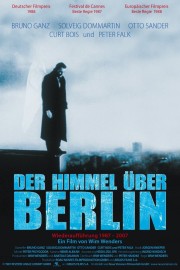Wings of Desire
When I describe the story of Wim Wenders’s “Wings of Desire” in this review, most people will no doubt recognize it as being similar to the 1998 film, “City of Angels.” That film was the American remake of Wenders’s film, and many people love that film, and I certainly understand why– although it follows a lot of typical Hollywood conventions in telling a love story, it also has a ponderous, spiritual side that few mainstream movies dare to display. It’s a fine movie, but Wenders’s is a great one, because it dives headlong into the spiritual side of humanity, the sometimes sad poetry of existence, and dares to imagine a love story that doesn’t feel the need to pander to the romantic in us, and still gets right to the heart of the matter.
Written by Wenders and playwright Peter Handke, “Wings of Desire” follows two angels through Berlin, which is still divided by the wall, who witness humanity. They listen to the inner thoughts of men, women and children, some of whom are happy, while some of whom have doubts, and concerns, that might lead them to think terrible things. The angels can never really change what happens, although they can console people, and maybe give them hope; ultimately, though, people will do what they want, even if that means taking their own life, as one man does. One of the angels (Daniel, played by Bruno Ganz) sees a trapeze artist (Solveig Dommartin) whose circus is shutting down. She longs be a success, and when we see her routine, we know she has talent, but she doubts herself. Daniel falls in love with her, and longs to take the plunge, to become human, to live, to love, and to die.
Both “Wings of Desire” and “City of Angels” are very good movies, and tell the same basic story well. However, “Wings of Desire” is better because of what is left inferred rather than spelled out. Little comes from the love story in “Desire” but longing and, well, desire for something romantic that will lift us up to the clouds, and that is a good approach. Wenders’s film is about beings who have spent many years observing humanity, empathizing with the suffering of mortality, and come to wish they could change things when they see real pain laid bare in front of them. For Daniel, it’s more than just being there for the trapeze artist, though– he wants to “smoke, and have coffee, and if you do it together, it’s fantastic,” in the words of an actor (Peter Falk, playing himself) who tells Daniel, “I can’t see you, but I know you’re there.” Falk, who gives a great performance, is as much an impetus for Daniel to take the plunge as Marion, the trapeze artist, is, and his scenes bring a human, down-to-Earth emotional center to a story that is more philosophical than spelled out, and while it may seem out of place, it’s essential to ground this movie to keep it from getting dull.
This is a beautiful film, pure and simple– beautifully shot (Henri Alekan, who moves to color when we see the point of views of humans, but whose black-and-white camerawork is truly unforgettable), beautifully scored (by Jürgen Knieper) with haunting voiceover by the actors, and beautifully performed. Wim Wenders has made a film that, like the works of Andrei Tarkovsky (whom is one of three directors the movie is dedicated to), brings the viewer in for a truly spiritual viewing experience without sacrificing moments of humor and humanity. The film asks questions of the audience that are questions a child would ask, “Why am I me and why not you? Why am I here and why not there? When did time begin and where does space end? Isn’t life under the sun just a dream? Isn’t what I see, hear, and smell just the mirage of a world before the world?” These are not infantile questions, though, but the ponderings of being who witness the world, but can’t quite comprehend it. Have we not asked these questions ourselves over the years? If we can’t figure out the answers right away, though, that’s not a bad thing, though. As Peter Falk says to Daniel after he falls, and has to leave Daniel, who says, “Wait! I want to know everything.”, “You need to figure that out for yourself. That’s the fun of it.” The fun of movies like “Wings of Desire” isn’t in watching a movie where every plot point is spelled out, but in finding what it means to us for ourselves. That’s the fun part of watching movies like Wenders’s– they don’t expect us to figure everything out during the act of watching it– the big revelations will come after the fact.










